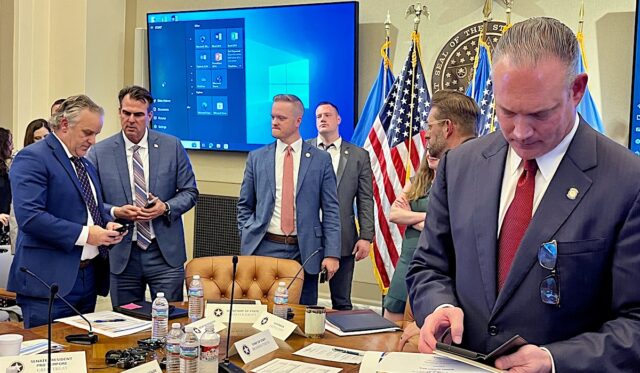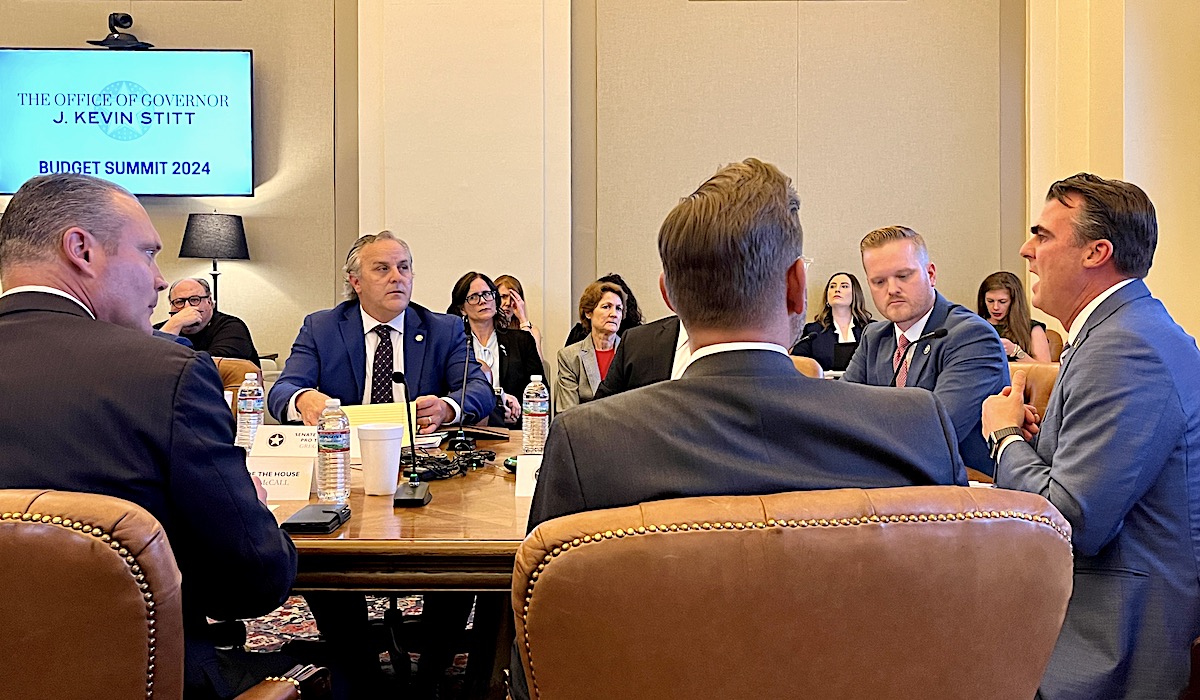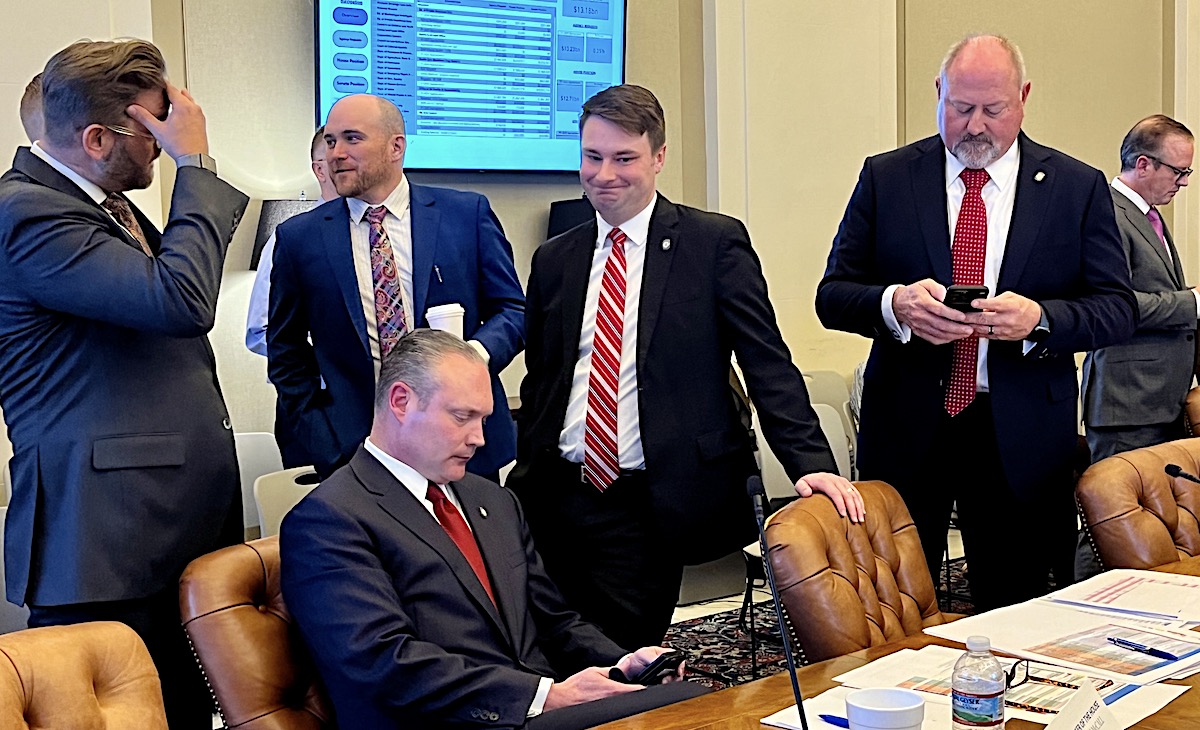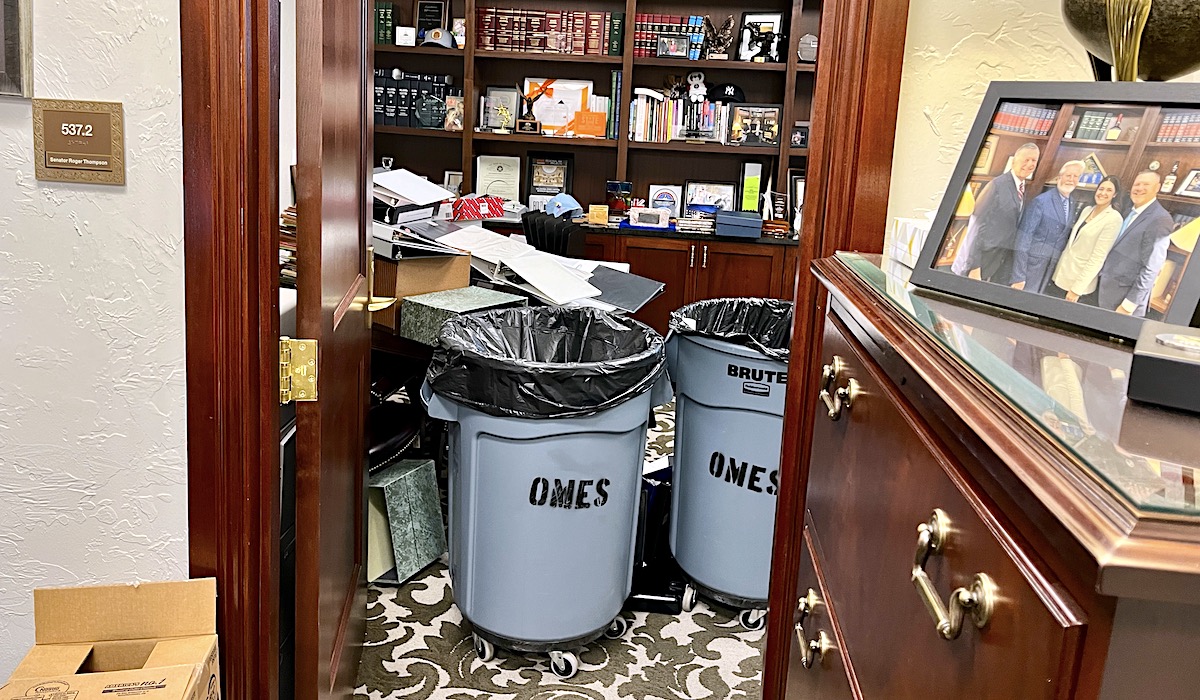

In an otherwise tense and serious public meeting about state budget negotiations, leaders of the Oklahoma Legislature and Gov. Kevin Stitt found humor only once as they passed around color-coded spreadsheet packets and leafed through their pages.
“Do you have to have some kind of special glasses to read this?” Senate President Pro Tempore Greg Treat (R-OKC) asked House Appropriations and Budget Committee Chairman Kevin Wallace (R-Wellston).
The nine elected officials seated around the table laughed, and for a few moments it seemed like placards, platitudes and pleasantries might define a day supposedly dedicated to charting a course forward for the final month of session.
But 20 minutes later, six years of built-up barbs began to fly between chamber leaders as they conducted a postmortem of ousted Senate Appropriations and Budget Committee Chairman Roger Thompson and bickered over dozens of “deals” Senate subcommittee chairmen had cut — apparently improperly — with their House counterparts.
“So those members of the Senate that conveyed to our leadership that they were authorized and had the ability to negotiate on Monday, I guess they did not and they lied to our team?” asked House Speaker Charles McCall (R-Atoka). “Or what’s the situation there?”
Treat said he was not in those meetings with Sen. Adam Pugh (R-Edmond) and Sen. Brent Howard (R-Altus) — the budget subcommittee chairmen for education and public safety, respectively — and did not know “what was said.”
“You’re not going to hear me allow members of the Senate to be called liars,” Treat said. “We wanted to have a public forum, and this is the public forum we are in.”
Indeed, Treat had praised the concept of Monday’s open meeting as a further step toward the “transformative” transparency he has sought since last fall. But his sudden removal of Thompson (R-Okemah) left the Senate side of the table somewhat outgunned during Monday’s two-hour meeting, which featured political pot shots, methodical review of education agency appropriation positions, and confusion over how or when anyone is supposed to know what the Senate will or will not agree to.
RELATED
After sacking Thompson, Treat replies to Stitt email by looping entire Legislature by Tres Savage
With Thompson out of the picture and new Chairman Chuck Hall (R-Perry) saying he felt like he had been in his role for “five minutes,” Treat largely led the line-by-line review of education items, saying the Senate subcommittee — not its chairman — would make negotiation decisions during a Tuesday meeting.
“What I said is that subcommittees have been empowered,” Treat told his House counterparts. “What you heard was that subcommittee chairs have been empowered.”
During the review of education position differences — which had been publicly visible and the subject of negotiations for weeks — Treat sometimes appeared unsure of the numbers presented on the House spreadsheet. With Senate Floor Leader Greg McCortney (R-Ada) and new Senate Appropriations and Budget Committee Vice Chairman Paul Rosino (R-OKC) barely speaking, the process of explaining to Treat what Thompson would already have known appeared to irk some House members.
“I could recite these numbers from my mind and tell you the six or so areas where we disagree,” Wallace said after the education review concluded and the gathered government officials took a break. “I really don’t like renegotiating agreements.”
‘I think we made progress, even though it didn’t feel like it’

When members reconvened and the livestream resumed around 4 p.m., it became clear all parties wanted a way to end Monday’s matinee.
House Speaker-designee Kyle Hilbert (R-Bristow) suggested focusing on key areas of difference between the chambers. Treat countered by proposing joint House-Senate subcommittee hearings. Stitt reiterated his talking points of limited government, lower taxes and strong savings, which somehow lightened a mood darkened by the repeated utterance of the word “subcommittee.”
In the end, the three legs of the proverbial state budget stool agreed to reconvene for further discussions at 2 p.m. Thursday, a meeting that many onlookers quickly assumed would be cancelled owing to the general futility of what had just transpired.
“I’m glad we had the meeting to get everybody talking. I think we made progress, even though it didn’t feel like it,” Stitt said after Monday’s meeting adjourned. “I think the Senate is going to go back now and at least know where everybody is, and then we can start the negotiation.”
But speaking after the meeting also, McCall and Wallace expressed frustration about the fact that negotiations had already occurred, meaning some of the House numbers Treat read aloud Monday reflected aggregate adjustments.
“We went into this meeting today thinking there were maybe four or five areas of the budget that needed to get fine-tuned for a budget deal, but that was not the position of the Senate,” McCall said. “We tried to ascertain today and ask very specific questions about how things would flow from their process — which has not been disclosed or discussed beyond the first seven weeks of session since their Senate resolution came out.
“It appeared to me that there is no consistency in their answers from issue to issue. They said they would be taking up votes on some things. They would not agree to take up votes on all things. Therefore, I don’t think their process is as transparent as they believe it is.”
Treat argued otherwise during Monday’s meeting, and afterward he stood firm on the importance of the Senate’s new subcommittee process.
“Perhaps a top-down dictate works in the House, but that’s not how the Senate operates. My caucus — and frankly the entire state — deserves better,” Treat said. “I am committed to an open and transparent process that includes all members. If the speaker can’t understand that, that’s his problem not mine.”
McCall said he finds the Senate’s third round of meetings with agency directors “perplexing.”
“It doesn’t seem like the process is productive,” McCall said. “I want to be respectful of their process, but now the Senate is using their own process to not be able to resolve an issue. Pro Tem Treat said he is in charge, yet he said he wasn’t in charge today. He said he would have to take everything back to his caucus to run through committees.”
McCortney, also speaking after the meeting, expressed frustration that the House did not accept Treat’s offer for joint subcommittee hearings on appropriation questions.
“It was sad to me that they would not agree to allow their members to meet with our members in a public forum and go over these numbers,” McCortney said. “That would have been the best way to get over the hump that we find ourselves on. (…) I think we would have a budget really fast.”
Airport projects, DPS training center critiqued by senators

House members believed they were close to having a “really fast” budget merely one week ago, but the subsequent seven days led to Monday’s public budget meeting. Following Thompson’s removal, Stitt emailed McCall and Treat to propose the public meeting, and Treat replied by looping the entire Legislature to announce his acceptance of the invitation.
When they finally found themselves around the same table, Treat thanked Stitt for calling the chambers together for public dialogue, and he ruminated on the virtues of the House’s online budget portal, which has been updated on Fridays following each week’s discussions.
“We didn’t spend money creating a portal, but I applaud you for it. I’m kind of jealous about it,” Treat said.
House leaders, however, repeatedly attempted to press Treat on the concept of an income tax rate reduction, a proposal supported by Stitt that carries a roughly $250 million annualized price tag. But while House leaders needled their counterparts over whether the Senate would put it up for a vote, Treat emphasized that the House sent the Senate a slate of tax-cut options and that the Senate had already chosen to eliminate the state portion of sales tax on groceries.
“We’re not interested in a CPAC score, we’re not interested in the next election, we’re interested in making sure that we set a very prudent course for the state of Oklahoma moving forward,” Treat said.
As the assemblage of elected officials prepared to adjourn Monday’s meeting, Hilbert suddenly asked Treat about the Senate leader’s statement last week that “pet projects” had snuck into budget negotiations from the House’s side of the ledger.
Treat pointed to a $41 million appropriation proposed to the Department of Aerospace and Aeronautics for “airport economic development projects.”
“There are several prominent projects in Lincoln County, there are projects in Atoka, there are projects in Stroud, there are projects in Okemah that came out last week,” Treat said. “There’s 108 airports, and the fact that three of the top nine ended up with top legislators I find very coincidental.”
House Majority Floor Leader Jon Echols (R-OKC) took umbrage at the comment.
“I think it’s a big accusation that a director was somehow manipulated or something had happened to them, so I would be very curious what the director says,” Echols said.
Treat held his ground.
“I stand by my curiosity in them,” Treat said.
After Monday’s meeting, McCall responded to Treat’s curiosity by noting that aerospace is Oklahoma’s second-largest industry and that a slate of airport projects has been funded over the last decade.
“This Atoka project they’re talking about has been on the books for 19 years. I think if it were a pet project for me, I would have talked about it some other time besides the last year that I’m here,” McCall said. “It’s highly offensive that anybody would discount the people of my House district and try to use me or my position or make an accusation of something I haven’t done to demean them, belittle them or render them unimportant.”
Seated to the side in McCall’s office while the speaker signed a stack of proclamations thicker than the Legislature’s budget spreadsheets, Wallace turned the topic to a half-funded and controversially proposed Department of Public Safety training center that Treat hinted at early in the day’s meeting. Wallace’s district covers Lincoln County.
“They brought up Lincoln County projects. They’re talking about the DPS (training center). That was vetted and approved last year through the [Legacy Capital Fund], phase one. Phase two is coming,” Wallace said. “But what I’m hearing is senators saying, ‘Hey, I don’t like where these projects are going even though they’re good for the state of Oklahoma, so I am going to disapprove them.’ And they are executive agency asks. I have no implementation on anything about it, but we did agree as a body last year to fund phase one of it. On phase two, the floor leader over in the Senate would not hear the bill that the senator had — Sen. Thompson — for phase two. So really, the problem is in that Senate area over there.”
Earlier this year, McCortney had declined to hear Thompson’s proposal to fund the remainder of the DPS project. Late Monday, McCortney elaborated on the dynamics of the issue by referencing the Council on Law Enforcement Education and Training, which is based in Pontotoc County and his district.
“There may be concerns about the location,” McCortney said after a long pause. “It’s interesting where it ended up. I know that some people have raised that. I think that there are a lot of concerns about the project. There are a lot of people opposed to the project itself, so I don’t think this is some personality-based thing. I think there are a lot of people opposed for some pretty legitimate reasons.
“(On) phase two, maybe some people feel like there’s a little bait and switch, if you will. If DPS needed — whatever it is, $160 million — they probably should have asked for that up front instead of trying to get half of it and then pretending like we have to do the second half because we did the first half when we never knew there was going to be a second ask.”
McCortney said the issue involves a lengthy “history lesson” that has made the matter contentious for years.
“It goes back to CLEET. Originally, DPS was supposed to be part of CLEET,” McCortney said. “They refused to do that, and that’s caused financial problems for CLEET, it’s caused financial problems for every sheriff’s department and every police department in the state because they refused to be a part of CLEET after it was created and after they had agreed to be a part of it, and now they want to build a facility that looks exactly like CLEET for themselves, and I just think a lot of people don’t think the state needs two of those.
“I think we’ve got one, and I think DPS could use it. If we need to build another dorm, we could do that and it would cost a lot less than the $150 million or $160 million that they’re asking for.”
Other items of budgetary disagreement between the chambers include a pair of large-sum designations of one-time dollars sought by the House and viewed cautiously by the Senate:
- $250 million for the Progressing Rural Economic Prosperity (PREP) Fund, which was created in the 2022 session for a variety of infrastructure and economic development investments; and
- $350 million for the Legacy Capital Financing (LCF) Fund, which was created in the 2023 session to allow selected capital projects to be self-financed at state agencies
Amid all of the day’s drama, the only budget item agreed to Monday by legislative leaders and Stitt was a $45 million commitment for the state’s portion of emergency aid to the Department of Emergency Management as response to recent tornado and storm damage.
“See, something got done today,” McCall said.
Treat agreed.
“There you go,” he said.





















